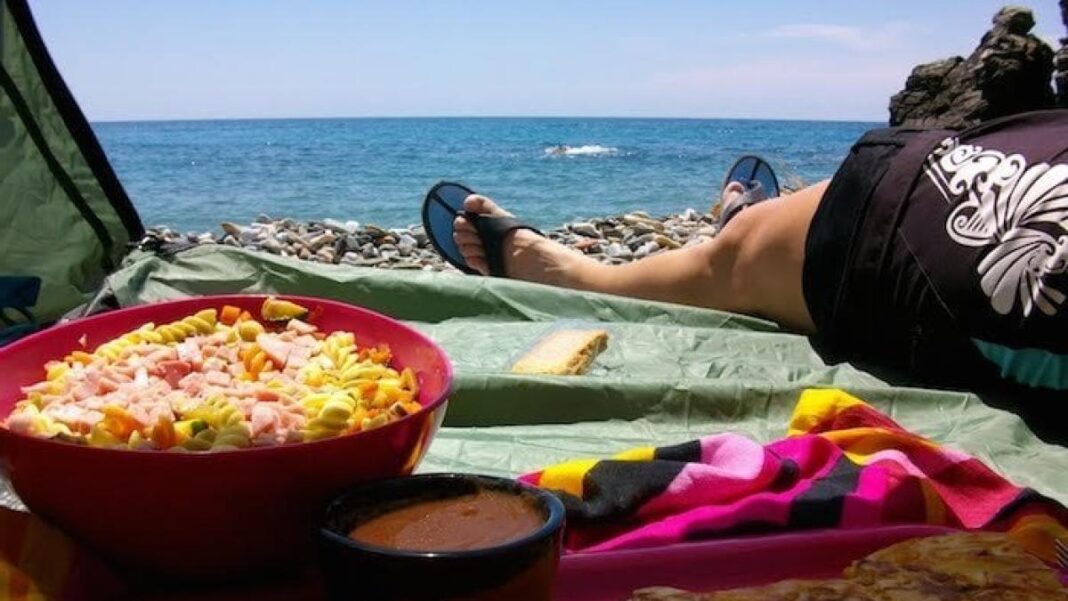BTN News: In a recent TikTok video that has sparked a lively debate, the popular TikTok duo @elargentinovenezolano shared their astonishment over a cultural difference they noticed while vacationing on a Spanish beach. The Argentine and Venezuelan influencers observed that unlike in their home countries, people in Spain seemed to have no qualms about jumping into the water immediately after eating, without waiting to digest their food.
In the video, recorded aboard a boat, they express their surprise: “I don’t know if this is a cultural thing or what, but we are the only two Latinos waiting to digest while everyone else has already dived into the sea. We finished eating barely five minutes ago.” This observation led them to ponder whether this habit might be unique to Latin Americans.
The video quickly went viral, garnering numerous comments and sparking a conversation about this intriguing cultural difference. One Spanish commenter clarified that, in Spain, the idea of waiting to digest before swimming used to be a widely held belief, particularly emphasized by mothers. However, over time, scientific evidence has shown that such caution is not always necessary, provided there isn’t a drastic change in temperature.
The commenter elaborated: “In Spain, it has been a tradition for a long time, but gradually scientific evidence has demonstrated that it’s not essential unless there is a sharp temperature contrast. You just need to wet areas that are more sensitive to temperature changes, like the nape of the neck, wrists, and waist, and then you can go fully into the water. Still, many people continue to adhere to this practice.”
This fascinating cultural insight has led to a broader discussion about the persistence of traditional beliefs and how they vary across different regions. In many Latin American countries, the belief that one must wait to digest before swimming is deeply ingrained. Mothers often insist that their children wait at least 30 minutes to an hour after eating before jumping back into the pool or ocean, out of fear that the sudden activity might lead to cramps or other discomforts.
However, as the Spanish commenter pointed out, modern science has largely debunked this myth. Studies have shown that while vigorous physical activity immediately after a large meal can cause discomfort, moderate activity such as swimming is generally safe. The primary concern is the body’s ability to regulate temperature; sudden immersion in cold water can cause a shock to the system, but this can be mitigated by gradually acclimating to the water as described.
The @elargentinovenezolano duo’s experience in Spain highlights how cultural practices around health and safety can vary widely even within the same activity, such as swimming. It also underscores the role of scientific research in challenging and changing long-held beliefs. As more people become aware of the scientific findings, such practices may continue to evolve.
This incident also offers a glimpse into how globalization and the exchange of cultural ideas are influencing everyday behaviors. With the internet and social media facilitating rapid sharing of information, people are increasingly exposed to different ways of thinking and doing things. This can lead to a blending of customs and the adoption of practices that might be more scientifically sound or simply more convenient.
In conclusion, the TikTok video by @elargentinovenezolano has done more than just entertain; it has opened up a conversation about cultural differences, the evolution of traditional beliefs, and the impact of scientific evidence on everyday practices. Whether you’re in Latin America or Europe, it’s a reminder that while customs may differ, the quest for understanding and adapting to new information is universal. So, the next time you find yourself on a beach after a meal, you might just reconsider that long-standing advice about waiting to digest before taking a dip.


